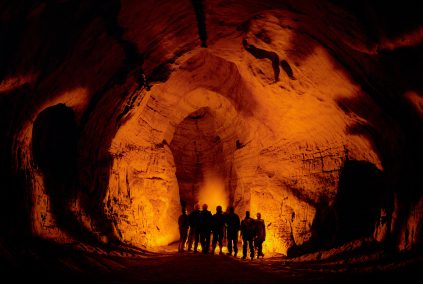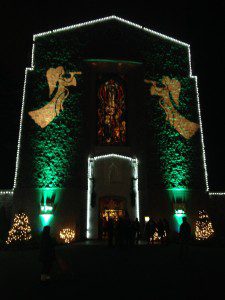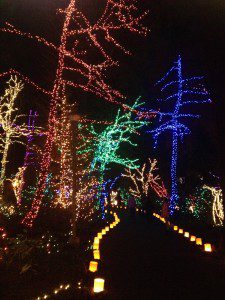 Have you ever slept in a cave? Years ago, a band of friends and I camped overnight in the bowels of a cave. Talk about darkness! I realized how precious light was that night. May I never take light for granted again. I doubt many people take for granted sunshine during winter months in the Pacific Northwest where I live. The clouds, the mist and the rain can dampen even the most resilient souls and fill their minds with doubts and fears concerning what lies before them.
Have you ever slept in a cave? Years ago, a band of friends and I camped overnight in the bowels of a cave. Talk about darkness! I realized how precious light was that night. May I never take light for granted again. I doubt many people take for granted sunshine during winter months in the Pacific Northwest where I live. The clouds, the mist and the rain can dampen even the most resilient souls and fill their minds with doubts and fears concerning what lies before them.
Perhaps such longing for light gives even greater incentive to those in the Greater Portland area to flock to The Grotto’s Festival of Lights every Christmas season in preparation for the new year. The other night, my family and I experienced the Festival of Lights’ enchantment. Upon viewing the celebration, I was reminded of John 1:4-5: “In him was life, and the life was the light of men. The light shines in the darkness, and the darkness has not overcome it” (ESV). Jesus is the life and light of the world. The darkness cannot overcome his light, as he penetrates the shadows. Jesus is the source of all light. All lesser lights bear witness to him inside and outside the church, as Karl Barth maintained. (See Barth’s discussion of this subject in Church Dogmatics, vol. IV/3.1, The Doctrine of Reconciliation, ed. G. W. Bromiley and T. F. Torrance {Edinburgh: T. & T. Clark, 1961}).
It was wonderful to hear people all around us speaking in different languages, as they came to experience the breathtaking beauty of the Christmas festival there at The Grotto with us. It is debated whether or not Jesus was born in a cave or if the church chose December 25th for the date to celebrate Christmas because of the Pagan celebration of the Sun’s birth on that day. What is not debated is people’s longing for light—even Jesus’ light—all over the world.
Still, not everyone finds faith in Christ to be a source of light. As Pope Francis acknowledged in his encyclical letter “Lumen Fidei” earlier this year, faith came to be associated with darkness in the modern period, as children of the Enlightenment celebrated autonomous reason. I have heard some claim that religious people are cave dwellers. Is faith to be associated with ignorance, or is it a light in the darkness of autonomous reason? Here is what Pope Francis has to say concerning such reason:
Slowly but surely, however, it would become evident that the light of autonomous reason is not enough to illumine the future; ultimately the future remains shadowy and fraught with fear of the unknown. As a result, humanity renounced the search for a great light, Truth itself, in order to be content with smaller lights which illumine the fleeting moment yet prove incapable of showing the way. Yet in the absence of light everything becomes confused; it is impossible to tell good from evil, or the road to our destination from other roads which take us in endless circles, going nowhere.
The Pope then proceeds to argue for the recovery of faith as a light which we must recover:
There is an urgent need, then, to see once again that faith is a light, for once the flame of faith dies out, all other lights begin to dim. The light of faith is unique, since it is capable of illuminating every aspect of human existence. A light this powerful cannot come from ourselves but from a more primordial source: in a word, it must come from God. Faith is born of an encounter with the living God who calls us and reveals his love, a love which precedes us and upon which we can lean for security and for building our lives. Transformed by this love, we gain fresh vision, new eyes to see; we realize that it contains a great promise of fulfilment, and that a vision of the future opens up before us. Faith, received from God as a supernatural gift, becomes a light for our way, guiding our journey through time. On the one hand, it is a light coming from the past, the light of the foundational memory of the life of Jesus which revealed his perfectly trustworthy love, a love capable of triumphing over death. Yet since Christ has risen and draws us beyond death, faith is also a light coming from the future and opening before us vast horizons which guide us beyond our isolated selves towards the breadth of communion. We come to see that faith does not dwell in shadow and gloom; it is a light for our darkness.

Faith is bound up with God’s love. As the Pope makes clear in his encyclical letter, faith being linked to love leads us to give ourselves to the common good in service to justice. Faith is grounded in the Father of all humankind and in Jesus as the incarnate and resurrected Lord who is the culmination of God’s embrace of humanity and the world. Such faith created and formed by God leads us forward to have hope no matter the circumstances and provide comfort to those experiencing tragedy in view of the undying light of Christ’s life and holy love.
Whether or not Jesus was born in a cave, he is the source of enduring light. Jesus said: “I am the light of the world. Whoever follows me will not walk in darkness, but will have the light of life” (John 8:12; ESV).* The light of his love creates faith and provides hope no matter the season. We don’t need to be cave dwellers lost in the shadows of doubt and autonomous reason anymore.
_______________
*It is quite likely that Jesus made this claim recorded in John 8 during the Feast of Tabernacles. Some have argued that during every evening of the feast, people danced with lit torches and sang throughout the night against the backdrop of the four large lit lamps in the temple’s court of women. It would have been an extraordinary spectacle with Jerusalem all aglow. Even more spectacular would Jesus’ own claim of being the light of the world to follow be against this backdrop. See my notes pertaining to this discussion in The Gospel of John: When Love Comes to Town (Downers Grove: InterVarsity Press, 2010), page 291; cf. page 290.
This piece is cross-posted at The Christian Post.












